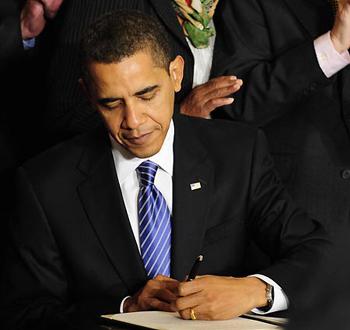World
Obama overturns Bush-era research policy
WATCH VIDEO
Source: CCTV.com | 03-10-2009 14:50
US President Barack Obama has signed an order that allows federal taxpayers' dollars to fund expanded embryonic stem cell research.
This reverses his predecessor's policy which was viewed by many as blocking development of potentially life-saving medical treatment.
 |
| U.S. President Barack Obama signs an Executive Order on stem cells research in the East Room of the White House in Washington, the United States of America, March 9, 2009. (Xinhua/Zhang Yan) |
The executive order signed on Monday reverses former President George W. Bush's directive. Bush had determined that using embryos to create additional stem cell lines was morally wrong. And, he had insisted research along those lines should not be funded by the government.
Obama called his decision a "difficult and delicate balance." There has been intense emotions generated on both sides of the long, contentious debate.
Barack Obama, US president, said, "The majority of Americans from across the political spectrum and from all backgrounds and beliefs have come to a consensus that we should pursue this research."
The order could trigger a significant push on research into treatment for ailments from diabetes to paralysis.
Proponents such as former first lady Nancy Reagan and the late actor Christopher Reeve had called to end restrictions on research spending.
The US president called on Congress to provide the funding. And, he asserted the order would never allow human cloning.
Embryonic stem cells are master cells that can morph into any cell of the body.
Scientists hope to harness them so they can create replacement tissues to treat a variety of diseases. Treatment might include new insulin-producing cells for diabetics, cells that could help those with Parkinson's disease or even Alzheimer's.
Editor:Zhang Yun



